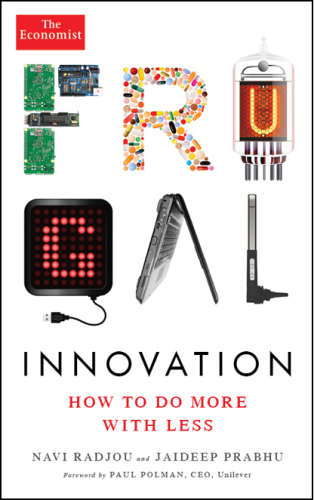
Frugal Innovation
How to do more with less
- اطلاعات
- نقد و بررسی
- دیدگاه کاربران
نقد و بررسی

December 22, 2014
In their illuminating latest work, coauthors Radjou and Prabhu (Jugaad Innovation), both academics at Cambridge Judge Business School in India, continue to tackle the topic of innovation. Maintaining that in today’s cost-conscious, eco-friendly business environment, organizations must not only learn to “do more with less,” but also to “do better with less,” they offer six principles to companies looking for new ways to compete. This accessible yet substantive book illustrates how “frugal innovation” is practiced throughout the world, using case studies, best practices, and techniques. Examples come from well-known global companies such as Renault, Novartis, GE, and Aetna, as well as lesser-known companies. Succinct chapter summaries add to the book’s usefulness. While Radjou and Prabhu acknowledge that “implementing a frugal innovation strategy in any organization can be daunting,” this practical overview will be a helpful guide to business owners and managers interested “in setting goals and priorities that match company’s culture and needs” on the road to combining frugality and innovation. Agent: Bridget Wagner, Zachary Shuster Harmsworth Literary Agency.

December 15, 2014
In textbook fashion, Radjou and Prabhu (Jugaad Innovation: Think Frugal, Be Flexible, Generate Breakthrough Growth, 2012) elucidate six principles of frugal innovation. In the preface, the authors define frugal innovation as "the ability to 'do more with less'-that is, to create significantly more business and social value while minimising the use of diminishing resources such as energy, capital and time." They recognize but minimize the challenges this entails: convincing business that developing cheaper, better products that last longer is not only good citizenship, but good strategy while educating consumers to adopt a different mindset, by means including "social pressure" and making "frugality aspirational." Yet the authors insist that such changes are already well underway, that a disappearing middle class has placed a premium on value and durability and that environmental consciousness and business savvy now go hand in hand. "Consumers in the developed world are becoming not only more value conscious but more values conscious," they write, and they proceed to offer case studies of how international corporations in industries ranging from cars to health care have benefitted from adapting to this changed mindset (profiled companies include Saatchi and Saatchi, Unilever and Aetna). The authors also discuss the transformation of consumers into "prosumers," partners in the development process, and of the connectivity within the "Internet of Things." The authors accept the growing dominance of "the so-called GAFAs (Google, Apple, Facebook and Amazon)" as a given rather than any sort of cultural threat. There is no question that both consumer and corporate cultures are changing radically and significantly, though debate remains as to just where we are on the continuum and whether all of this change is for the good. A jargon-heavy book for professionals rather than general readers.
COPYRIGHT(2014) Kirkus Reviews, ALL RIGHTS RESERVED.




دیدگاه کاربران